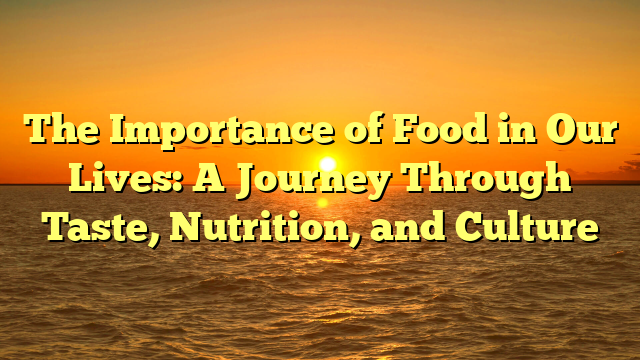
Food is much more than mere sustenance for the body; it plays an essential role in our lives,
influencing not only our physical health but also our emotions, social lives, and even cultural
identity. It’s a universal necessity, yet its significance stretches far beyond just keeping us
alive. The way we approach food—what we eat, how we eat, and why we eat—reflects
various aspects of our environment, upbringing, and personal preferences.
The Role of Food in Nutrition
At its core, food provides the nutrients required for our bodies to function properly. The
energy we get from food fuels our daily activities, while its components—proteins, fats,
carbohydrates, vitamins, and minerals—support the repair, growth, and maintenance of our
organs and tissues. A balanced diet is vital for ensuring optimal health, and consuming a
variety of foods is essential for obtaining all the necessary nutrients.
Proteins, for example, are crucial for the growth and repair of muscles, enzymes, and
hormones. They are found in animal products like meat, fish, and eggs, as well as
plant-based sources like beans, lentils, and tofu. Carbohydrates, primarily from grains,
vegetables, and fruits, are the body’s main energy source. Fats, although often demonized in
some diets, are essential for absorbing vitamins, supporting cell function, and providing
long-term energy storage.
Moreover, the micronutrients—vitamins and minerals—are equally important in smaller
amounts. Vitamin A, for instance, is crucial for maintaining healthy skin and vision, while
vitamin C is important for immune function. Minerals such as calcium and iron are essential
for strong bones and healthy red blood cells, respectively.
A balanced diet that incorporates a range of food types ensures that the body gets
everything it needs to stay healthy and function effectively. Unfortunately, modern lifestyles,
with the rise of processed foods and fast food culture, have led to an increase in diet-related
health problems, such as obesity, diabetes, and heart disease. This has sparked a renewed
focus on whole, nutritious foods and a return to mindful eating practices.
The Social and Cultural Significance of Food
Food is often a central component in social and cultural activities. From family meals to
elaborate feasts, food brings people together. It is through food that we celebrate important
milestones in life—birthdays, weddings, holidays—and share experiences with friends and
family. slot 25+25 of cooking and eating together is a bonding experience that transcends
geographic, linguistic, and social barriers. Whether it’s sharing a home-cooked meal or
dining out, food is a medium of connection and communication.
Culturally, food represents identity and tradition. Every culture has its own unique cuisine, a
reflection of geography, history, and the availability of ingredients. For example, Italian
cuisine is known for its use of olive oil, tomatoes, and pasta, while Japanese cuisine relies
heavily on rice, fish, and seaweed. These traditional dishes, passed down through
generations, help preserve cultural heritage and tell the story of a community’s history and
values.
Food also plays an important role in religious practices. For many, meals are more than just
a way to nourish the body; they are sacred rituals that express gratitude, commemorate
ancestors, or fulfill spiritual obligations. The sharing of food during religious festivals or
ceremonies can be seen as a way to connect with a higher power or with a community of
like-minded individuals.
The Evolution of Food Consumption
The way we approach food has evolved significantly over time. Historically, humans were
hunters and gatherers, consuming what was available in nature. As agricultural practices
developed, people began to cultivate crops and domesticate animals, which led to the
growth of civilizations and the rise of trade. Food became a symbol of wealth and power, and
the ability to access rare ingredients was a mark of distinction.
With the industrial revolution and the advent of modern transportation, food production and
distribution transformed. The introduction of packaged and processed foods made food more
accessible but also led to the rise of convenience over quality. Today, fast food chains,
pre-packaged meals, and instant snacks dominate many parts of the world. While these
foods are convenient, they often lack the nutritional value and variety found in fresh,
home-cooked meals.
In recent years, there has been a resurgence of interest in food sustainability and local,
organic ingredients. Many people are returning to traditional cooking methods and focusing
on locally sourced ingredients to reduce their carbon footprint and improve the quality of their
meals. This shift is also driven by an increasing awareness of the environmental impact of
large-scale food production and the ethical concerns surrounding factory farming.
Food and Mental Well-Being
The connection between food and mental health is an area of growing interest. Nutrition can
have a profound effect on our mood, cognitive function, and emotional well-being. Certain
nutrients, such as omega-3 fatty acids, antioxidants, and vitamins, have been shown to
support brain health and reduce the risk of mental health disorders like depression and
anxiety.
In addition, the act of eating itself can influence our emotional state. For example, comfort
foods like chocolate, ice cream, or a hearty soup can provide temporary feelings of pleasure
and contentment. However, relying too much on emotional eating can be detrimental in the
long term, as it may lead to unhealthy eating patterns and contribute to weight gain or other
health issues.
Food also plays a role in mindfulness and stress management. Preparing and savoring a
meal with full attention can provide a meditative experience, allowing individuals to slow
down and connect with their senses. The act of cooking, in particular, can be therapeutic, as
it engages creativity and provides a sense of accomplishment.
Conclusion
Food is not just a necessity for survival; it is a complex, multifaceted part of human existence
that nourishes the body, connects us with others, and shapes our cultures and traditions. By
understanding the importance of food in nutrition, social life, culture, and mental health, we
can make more informed choices about what we eat and how we relate to food. Ultimately,
food is a powerful tool that can promote well-being, strengthen communities, and contribute
to a healthier, more sustainable world.




